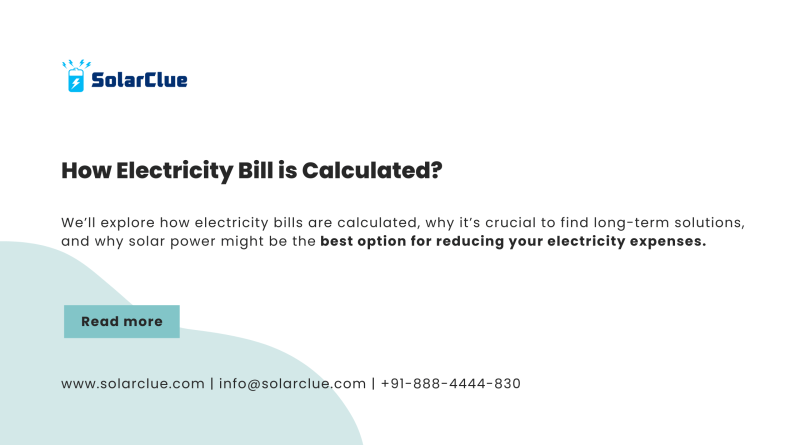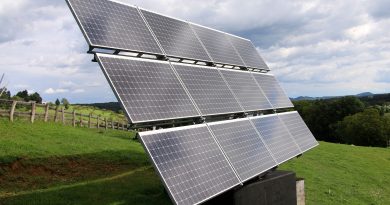How Electricity Bill is calculated?
Electricity is an essential part of modern life, powering our homes, appliances, and devices. However, with the increasing reliance on electricity, many households find themselves grappling with high electricity bills. While paying these bills is necessary, it’s important to understand that consistently paying high electricity bills without taking action to reduce them isn’t sustainable in the long run. In this blog, we’ll explore how electricity bills are calculated, why it’s crucial to find long-term solutions, and why solar power might be the best option for reducing your electricity expenses.
Table of Contents
How Is Your Electricity Bill Calculated?
Understanding how your electricity bill is calculated is the first step toward managing your energy costs effectively. Typically, your electricity bill is composed of the following elements:
1. Electricity Consumption (kWh)
The most significant part of your electricity bill is based on your consumption, measured in kilowatt-hours (kWh). This represents the amount of electricity you use over a billing period. The more appliances and devices you use, the higher your consumption will be.
2. Fixed Charges
Most utility companies include fixed charges in your bill, which are fees that don’t change regardless of your consumption. These charges cover the costs of maintaining the electricity grid, customer service, and other administrative expenses.
3. Energy Charges
Energy charges are the costs associated with the actual electricity you consume. This is usually calculated by multiplying your total kWh usage by the rate per kWh charged by your utility provider.
4. Fuel Surcharges
Some regions may have fuel surcharges that reflect the fluctuating costs of generating electricity, particularly if the power is sourced from fossil fuels. These charges can vary based on market conditions.
5. Taxes and Other Fees
In addition to the above, your bill may include various taxes and regulatory fees imposed by the government or regulatory bodies. These can include environmental taxes, local government taxes, and other levies.
Why Paying High Electricity Bills Isn’t a Long-Term Solution
While paying your electricity bill is necessary, doing so without seeking ways to reduce your energy consumption can lead to significant long-term financial strain. Here are a few reasons why consistently paying high electricity bills isn’t sustainable:
1. Rising Energy Costs
Energy prices are subject to market fluctuations and tend to increase over time. As energy costs rise, so will your electricity bill, making it increasingly challenging to manage your household budget.
2. Environmental Impact
High electricity consumption often correlates with higher environmental impact, particularly if your energy comes from non-renewable sources like coal or natural gas. This contributes to carbon emissions and other environmental issues.
3. Missed Opportunities for Savings
By not taking steps to reduce your electricity usage, you miss out on potential savings. Simple changes in behavior, energy-efficient appliances, or investing in renewable energy sources can significantly lower your bills over time.
Why Solar Power Is the Best Long-Term Solution
One of the most effective ways to reduce your electricity bills sustainably is by investing in solar power. Here’s why:
1. Reduction in Energy Costs
Solar panels generate electricity from sunlight, allowing you to produce your own energy. By reducing your reliance on the grid, you can significantly lower your electricity bills. In some cases, you may even eliminate them altogether.
2. Government Incentives
Many governments offer incentives, subsidies, and tax breaks for installing solar panels. These incentives can help offset the initial costs of solar installation, making it a more affordable option for homeowners.
3. Long-Term Savings
Although the initial investment in solar panels can be substantial, the long-term savings are significant. Solar panels typically pay for themselves within a few years, and after that, you’ll be generating free electricity for the rest of their lifespan, which can be 25 years or more.
4. Environmental Benefits
Solar power is a clean, renewable energy source. By switching to solar, you’re reducing your carbon footprint and contributing to a more sustainable future.
5. Increased Home Value
Homes with solar panels are often more attractive to buyers and can command higher resale values. Investing in solar not only saves you money but can also be a smart financial move when it comes time to sell your home.
Conclusion
High electricity bills are more than just a monthly expense; they can be a financial burden that grows over time. Understanding how your electricity bill is calculated and why it’s crucial to find long-term solutions is the first step toward managing your energy costs. Solar power offers a sustainable and effective way to reduce your electricity bills, providing both financial savings and environmental benefits. By investing in solar, you’re not just lowering your electricity bills—you’re making a commitment to a more sustainable and financially secure future.
Curious about how your electricity bill is calculated?
Understanding the details can help you manage your energy costs more effectively.
Visit SolarClue to learn more and discover how you can take control of your energy usage with our expert insights and solutions. Don’t let high electricity bills surprise you—get informed and start saving with SolarClue today!



